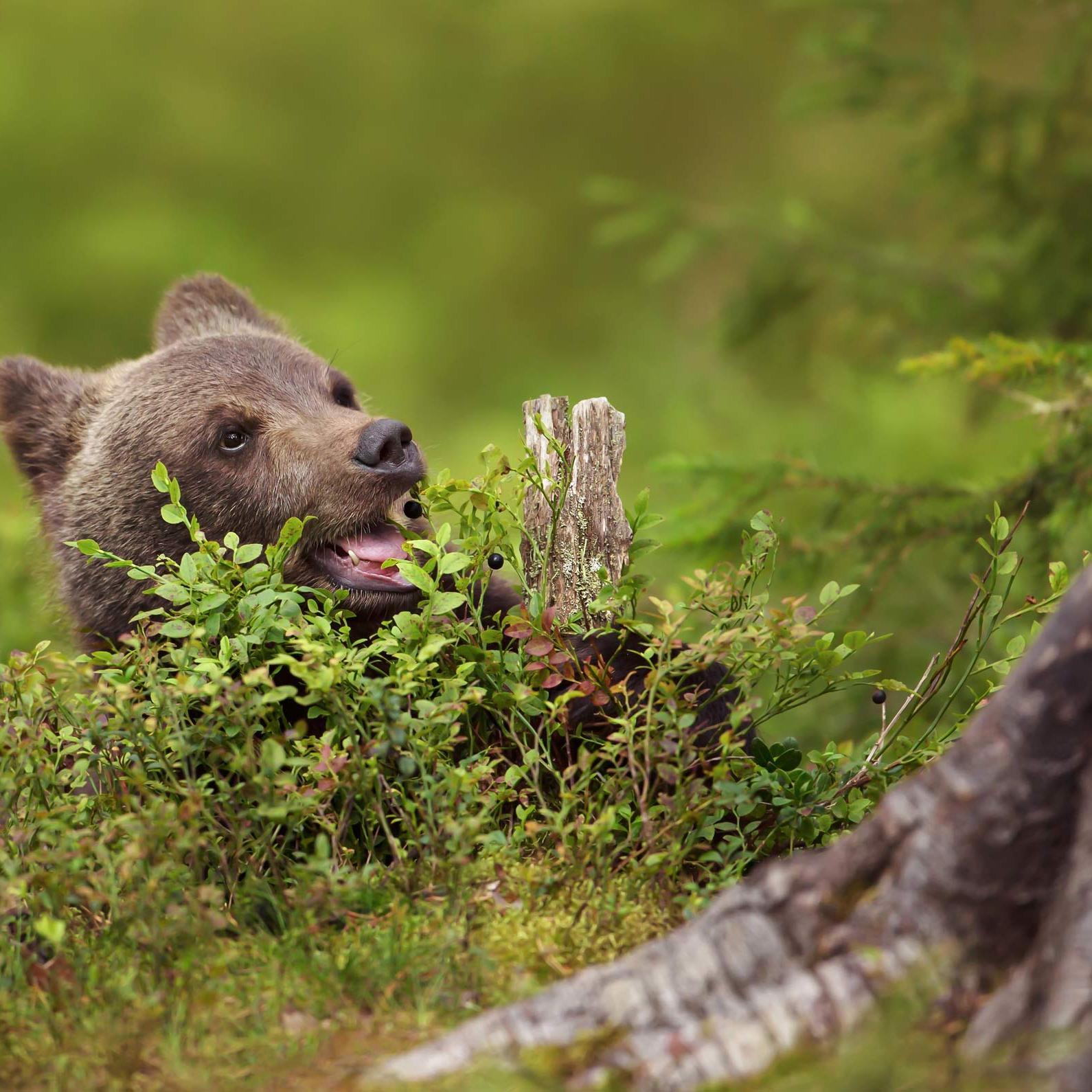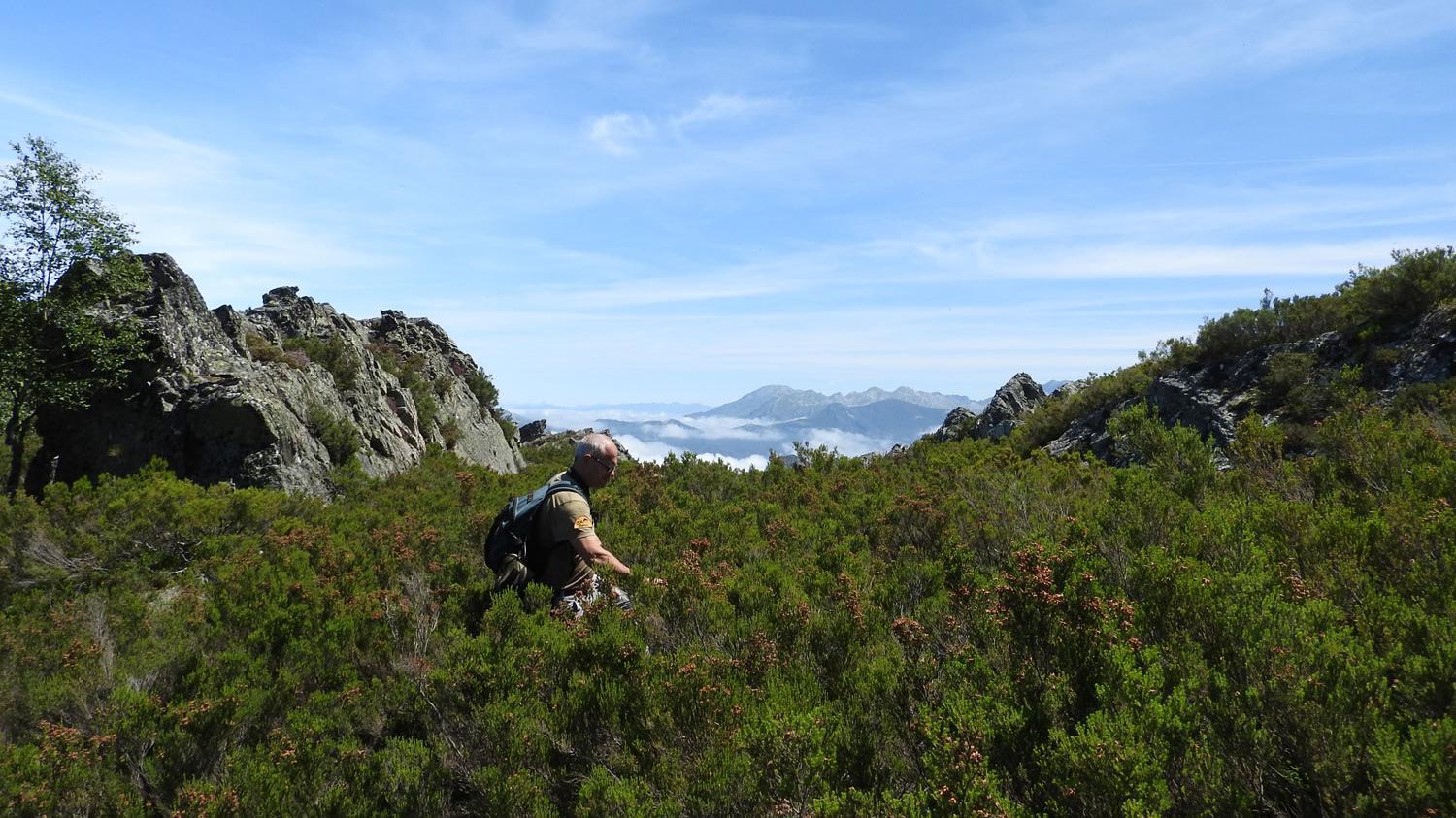Bears in Spain
The fight against poaching
Spain’s bears are living proof of just how important it is – even in seemingly hopeless situations - to do all we can to pave the way for a better future. In addition to habitat fragmentation, it was poaching in particular that had brought the bears in the Cantabrian Mountains to the brink of extinction. Since the mid-1990s, EuroNatur and its Spanish project partner Fapas have been fighting to secure this area in northern Spain as a habitat for brown bears. Thanks to this tireless work, the situation is slowly but surely improving for bears in the Cantabrian Mountains. In the space of ten years, the population there has almost doubled.
Stable populations in the West, some catching up to do in the East
In the western part of the mountains at least, brown bear numbers have increased again. Female bears are now rearing their cubs even in areas where there have been no bear offspring for decades. The situation is less encouraging in the eastern part of the Cantabrian Mountains. Here, isolated from the western population, a second bear population exists. However, this population is worryingly small, probably comprising no more than 20 to 25 bears. Conversely, the challenge of improving the living conditions of these rare animals so they can once again extend their range - not just in the west but also in the eastern part of the Cantabrian Mountains – is considerable.
What EuroNatur and its partners are doing to protect brown bears in Spain and what we have been able to achieve together:
- Targeting poachers: EuroNatur is helping Fapas to transfer strategies which have been successful in the fight against poaching in western areas, to eastern parts of the Cantabrian Mountains. The strong presence of rangers in poaching hotspots is proving to be particularly effective.
- Planting trees for bears: Fruits are the number one item on the bears' menu. In collaboration with EuroNatur, Fapas is planting rare wild fruit and chestnut trees to improve the range of foods available to the bears. Bear-resistant beehives are also being installed to ensure the fruit trees are pollinated. Thanks to this improved food supply, female bears are now rearing their cubs even in areas where there have been no bear offspring for decades.
- Keeping an eye on the bears: Together with Fapas, EuroNatur is running a comprehensive monitoring programme. With the aid of camera traps and by following tracks on the ground, our partners are collecting data on the distribution, population density and lifestyle of brown bears. In recent years, we have gained valuable information this way and, as a result, we have been able to develop effective conservation strategies.
- Food for carrion-eaters: For bears and other wildlife, carrion is - at least some of the time - an important food source. In 2009, following protests from EuroNatur and other organisations, the EU slightly relaxed its inflexible hygiene regulations. In certain regions, it is possible to leave farm animal carcasses out in the wild again. In the “Valley of the Bears”, the carcasses of horses, donkeys etc. are regularly laid out on a feeding ground for carrion-eaters.
Partners: Fapas (Fondo para la Protección de los Animales Salvajes, Foundation for the protection of wild animals).
Funding: EuroNatur donors and
Bears in Southeastern Europe
Pressure from deforestation, shooting quotas and volume of traffic
Together with Russia and Finland, Southeastern Europe is one of the last large areas inhabited by the European brown bear. The dangers faced by bears are as varied as the countries they live in. In the Romanian Carpathians, for example, Europe’s largest bear population is under threat from the ruthless deforestation of its habitat. Due to this loss of habitat, bears are increasingly entering human settlements and this is leading to human-animal conflict.
In countries such as Greece and Croatia, the dissection of bear habitats by roads and railway lines is a burning issue. Wide transport routes often present insurmountable barriers for bears. The already small sub-populations are being fragmented and split up to such an extent that they are no longer viable in the long term. Furthermore, in almost all of the Balkan countries, shooting quotas are set far too high - particularly in view of the fact that there are virtually no reliable figures on the countries’ respective bear populations.
Bears as attractions
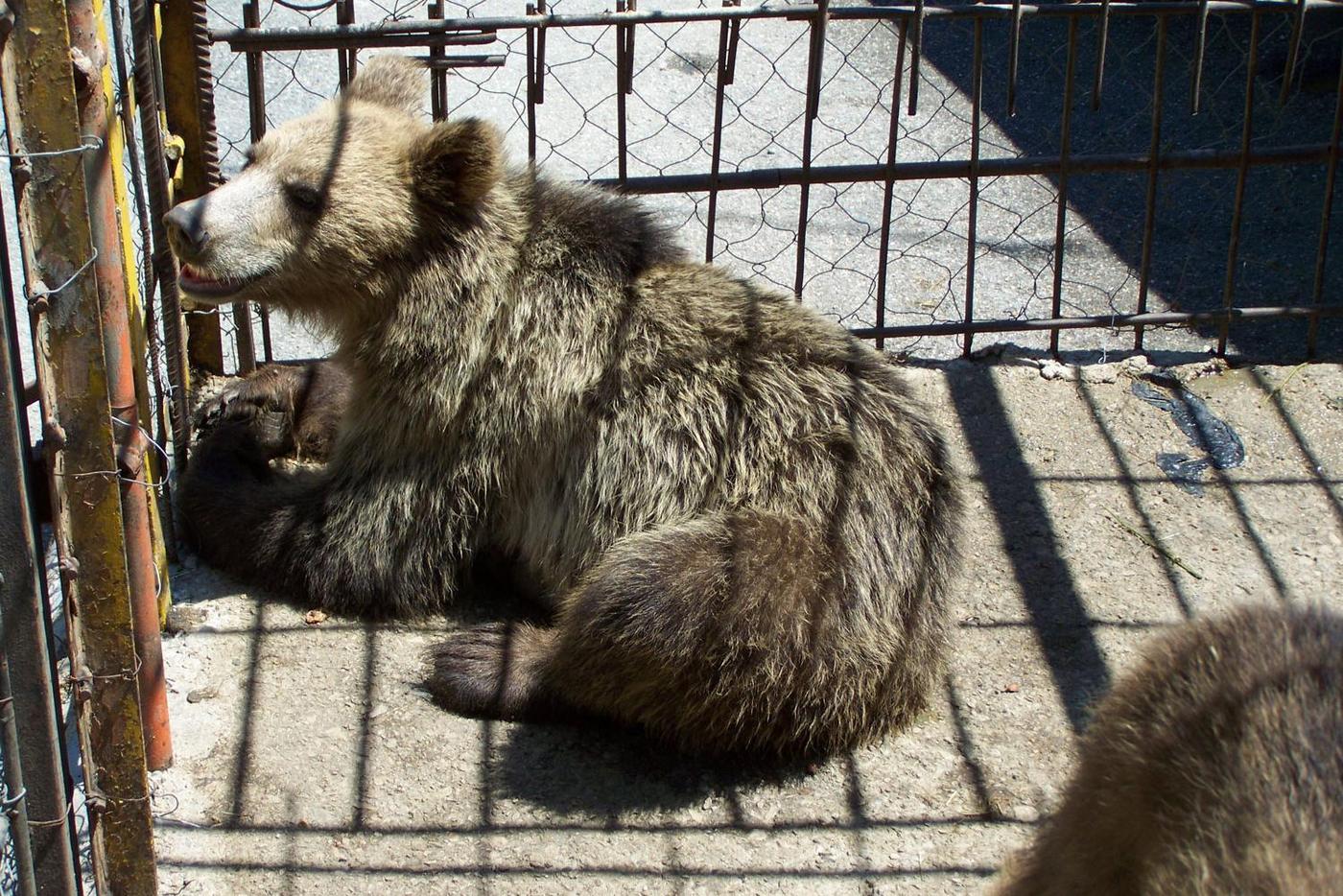
In Albania, brown bears are still being put on show in bars and restaurants. The animals lead a miserable existence in cages that are far too small and they quite often end up on the menu. This practice is also having dramatic consequences for the country’s wild bear population. The practice of shooting female bears and taking away their cubs means the bear population in Albania is in danger of complete collapse.
Bear conservation in the border triangle: brown bear tripoint project
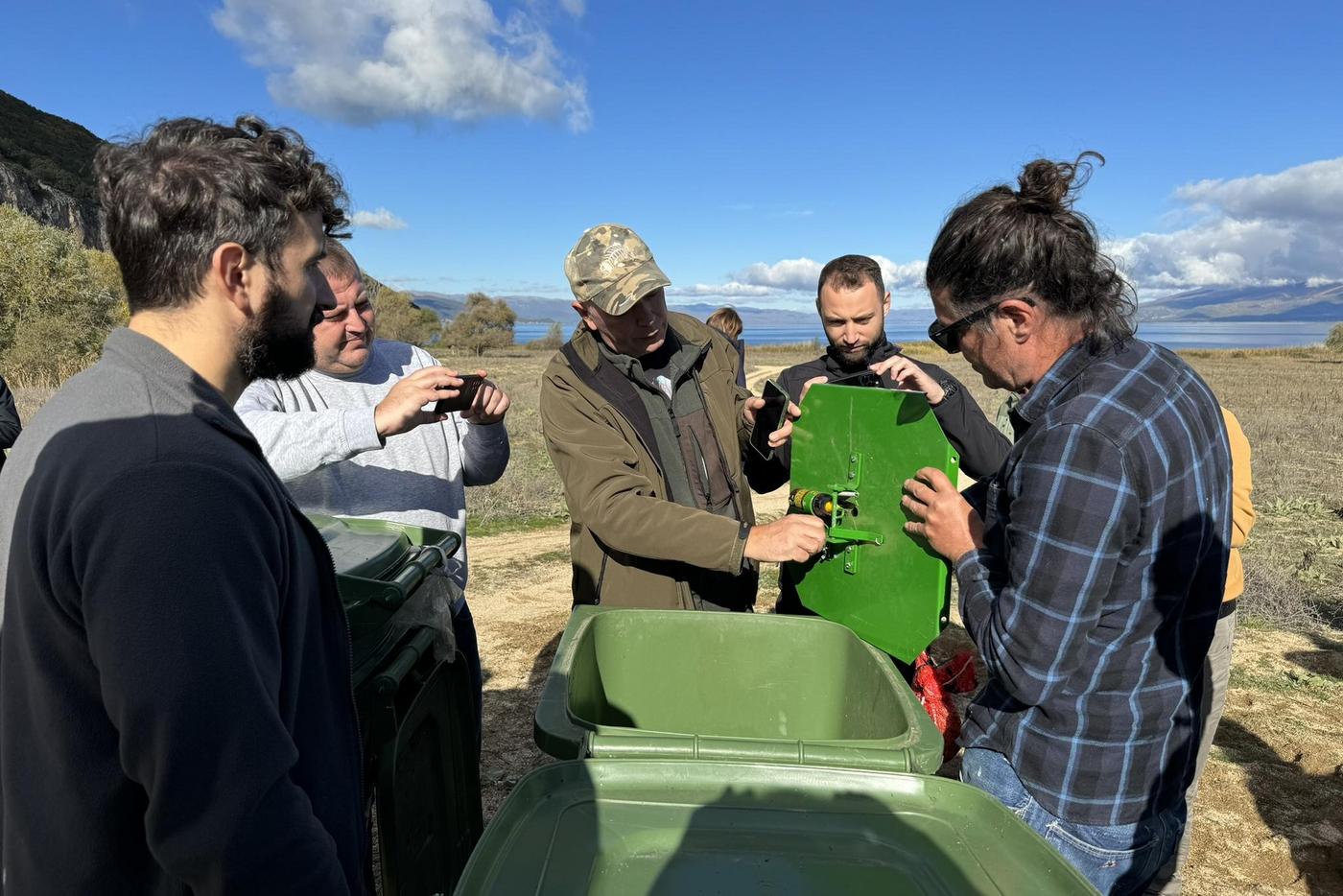
Bear-proof rubbish bins are an important measure to prevent human-wildlife conflicts. They were presented at a workshop in Greece.
© Antje Henkelmann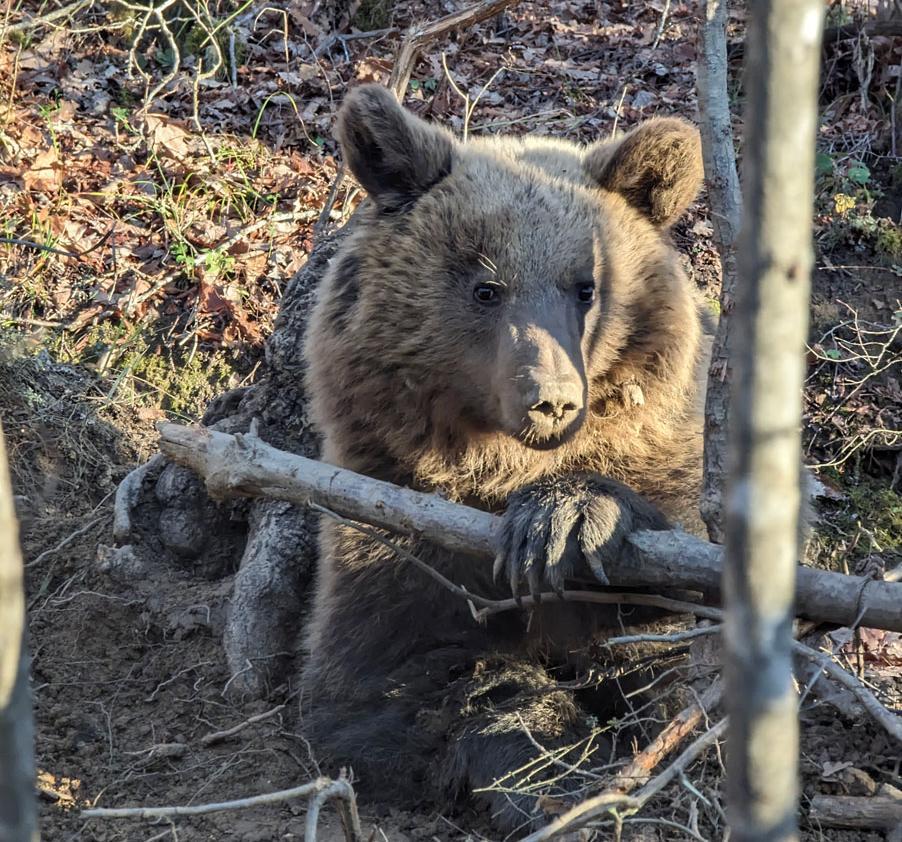
At the end of December 2023, an emergency operation was carried out in Albania, where a female bear had been caught by a snare trap. With the help of the potential BET forces trained in the previous training sessions and an experienced team from Greece, the animal was rescued.
© PPNEAFrom April 2022 to December 2023, EuroNatur was involved in the cross-border Tripoint brown bear project (TBB) with its partners MES, PPNEA, Callisto and Ekosvest and with the support of the Italian foundation Fondazione Capellino. In the border region of Albania, Greece and North Macedonia, a conservation network was established across national borders that engages local stakeholders and strengthens political cooperation between these countries. The international project team has also developed and established joint methods for monitoring bear populations.
Like in many parts of Europe, the habitats of brown bears in our project area are under severe threat from infrastructure projects and other human activities, leading to continuous fragmentation. Recognising the urgency of the situation, the project's main objective was the immediate improvement of bear habitats. We also supported practical solutions and raised public awareness to foster the low-conflict coexistence of bears and humans in the region, implementing concrete measures such as training bear intervention teams (BET). We firmly believe that the acceptance of the local population is crucial for the long-term survival of the brown bear in the southern Balkans.
Even the project draws to a close, the partners remain steadfast in their commitment to the long-term goal of population-based brown bear management in the region. This dedication ensures that the project's impact will endure, safeguarding the future of the brown bear in the southern Balkans.
What EuroNatur and its partners are doing to protect brown bears in Southeastern Europe and what we have been able to achieve together:
- Building bridges: The extent to which the negative impacts of transport routes can be mitigated by crossing aids such as green bridges has been emphatically demonstrated by EuroNatur and its Croatian partners along the motorway which runs between Zagreb and Rijeka. The data gathered there has been so compelling that, for newly constructed motorways in Croatia, plans now incorporate a large number of green bridges right from the very outset.
- Determining populations: In some countries, there are no reliable figures on bear populations. In Bosnia and Herzegovina, hunters are now being encouraged to collect samples of bear faeces. The samples are then analysed at the University of Banja Luka. As a result, reliable assertions can be made about the size of the country’s bear population.
- Avoiding conflict between humans and wild animals: EuroNatur is supporting the use of measures which aim to prevent problems between bears and humans from arising in the first place. These include protecting livestock with guardian dogs and installing bear-resistant rubbish bins. EuroNatur has also provided support for training and equipping bear emergency teams in several countries in the Western Balkans. The teams intervene in the event of any human-animal conflict.
- Change through Education: In Albania, we are conducting awareness campaigns with our partners. We want to mobilise civil society and ensure that it is no longer socially acceptable to have bears in bars and restaurants.
- Connecting habitats: In the Dinarides, we are pushing for the establishment of transboundary protected areas. We are thus paving the way for a possible return of bears to the Alps, over and above the few isolated populations which already exist there.
Partners: PPNEA, MES, CZIP, CZZS, Callisto, Ekosvest, Faculty of Veterinary Medicine of the University of Zagreb.
Funding: Fondazione Capellino, EuroNatur donors and sponsors
Join in and help us!
Join the many people getting actively involved for brown bears in Europe. We are grateful for any donation or active contribution you can make! In doing so, you are supporting an independent and networked civil society in Europe, which is campaigning vigorously to protect Europe’s bears.




